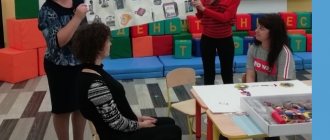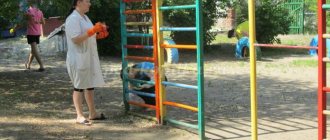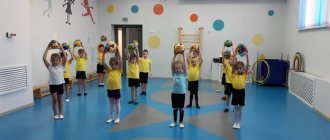CHILDHOOD GUIDE
From work experience
“Interactive forms of working with families in preschool educational institutions”
Yakusheva Nadezhda Vladimirovna,
senior teacher of MBDOU No. 38,
Zapolyarny, Murmansk region.
In accordance with the new law “On Education in the Russian Federation,” one of the main tasks facing a preschool institution is “interaction with the family to ensure the full development of the child’s personality.” Article 18 of the Law of the Russian Federation “On Education” states: “Parents are the first teachers. They are obliged to lay the first foundations for the physical, moral and intellectual development of the child’s personality at an early age.”
The basis of the interaction between the preschool educational institution and the family is the cooperation of teachers and parents, which presupposes the equality of the partners’ positions, the respectful attitude of the interacting parties towards each other, taking into account individual capabilities and abilities. (FSES DO), which meets new social needs, also requires working with families The Federal State Educational Standard for Preschool Education states that work with parents should have a differentiated approach, taking into account social status, family microclimate, parental requests and the degree of interest of parents in the activities of preschool educational institutions, and improving the culture of pedagogical literacy of the family.
We have identified the following annual tasks for ourselves:
2016 academic year
— Building productive interaction with families of pupils as a means of implementing the Federal State Educational Standard for Education
— developing skills for positive interaction between participants in the educational process;
— improving the psychological and pedagogical culture of preschool employees;
— creation of a unified educational space “family - kindergarten” for equal and interested interaction;
— organization of professional support for parents from a teacher-psychologist.
2017 academic year
— Formation of partnerships between participants in the educational process, active inclusion of parents (legal representatives) in the life of preschool educational institutions as a means of implementing the federal state standard of preschool education:
— improving the psychological and pedagogical culture of preschool employees, the value attitude of kindergarten employees towards the family;
— creating optimal conditions for the development of preschool children through effective interaction between children, parents (legal representatives) and teachers;
- use of constructive educational efforts of parents (legal representatives) and teachers of preschool educational institutions to assist the family in resolving issues of raising a child;
— generalization of methodological materials on holding “Family Day” in preschool educational institutions.
We have seen that classical forms of cooperation with modern parents do not bring the desired result. Society is changing, parents' needs are changing, so it is necessary to look for new forms of cooperation.
In our opinion, the use of interactive methods in working with parents is the most effective way to interact with families.
Interactive forms of working with parents are methods that allow you to introduce effective communication into the process, which involves involving parents as an active participant, rather than a listener or observer.
Cooperation involves not only mutual actions, but also mutual understanding, mutual respect, mutual trust, and mutual influence. Active joint work of teachers and parents allows us to get to know each other better and helps strengthen their relationships. Helps solve their common problems : education and upbringing of the future generation, creating comfortable conditions for the full development of the child’s personality.
There are conditions for organizing interactive forms of cooperation:
- positive relationships
- democratic style
- cooperation in the process of communication with each other
- reliance on the personal experience of parents.
Let's consider the options:
— leisure activities for children and parents; (wide Maslenitsa, we are strong and brave, day of knowledge, day of the sun);
- holidays; (autumn gatherings, New Year, March 8, graduation party, kindergarten birthday);
— coverage of the life of the preschool educational institution on the page on the social network “VKontakte”, on the official website of the preschool educational institution; (https://vk.com/club93730918, https://dou38sansity.ucoz.ru);
— parent practical seminars; (organization of cultural practices in preschool educational institutions, “Sunny Circle” in support of family and childhood, a practice-oriented seminar - at which presentations and workshops were presented, “Effective practices in working with children”, child-parent conference “Who is to blame? What to do?” );
— open classes for parents to watch;
— family sports, creative meetings;
— thematic exhibitions (works, drawings, photo exhibitions); (thematic seasonal exhibitions of artwork and drawings, “Cosmonautics Day”, “There is a special day in March”, exhibition of children’s drawings in designer frames, “masterpieces from flora”, photo exhibition “April Fool’s Day”, exhibition of family creativity, “woman with child on hands”, “Family protection and support”, “Our family’s favorite dishes for the New Year’s table”, “We are strong and brave”);
— helpline mail, helpline;
— monthly themed day “Family Day”;
- stock; (a book as a gift, “Live in the Forest”, “flowers for heroes”, “each little bird has its own feeder”, tree of friendship, Christmas tree of wishes, “Flower - seven-flowered”);
— annual festival “Family and Peace”;
— competitions; ( art - felt boots, theatrical family performances, a brighter world together, a vegetable garden on the window, children's sports competition, the best snowman on the site, theatrical mosaic, "April Fool's Day", "The Art of Being a Family");
— the work of the association “School of Happy Parents” under the guidance of a teacher-psychologist;
— work of the inclusive theater “Ray of Hope”;
— inclusive holidays; (Friendship Day, New Year's gatherings, we are strong and brave);
- exhibitions - tastings; (“Miracle – cereal”, “Lark’s day”, baking competition, “autumn gifts”);
— Internet voting (to determine the winners of competitions, surveys on the implementation of certain services in preschool educational institutions);
— environmental subbotniks (Big Deeds of Small Hands, All-Russian Environmental Subbotnik).
Let's consider one of them - the social network "Vkontakte", which for many parents and teaching staff has become a publicly accessible form of interaction and communication, as it provides a number of opportunities for both parties: online communication, saving time, exchanging documents, creating a group/community for systematization news and information about the life of children and more.
A group on VKontakte is one of the main tools for establishing inter-user connections, where parents act not just as passive listeners, but as active subjects who share their education experiences, give advice, take part in group discussions and voting, build communication not only with the teacher, but also with each other. On the VKontakte Page, “Sunny City,” we regularly update information about events in the kindergarten, publish photographs from matinees, subbotniks and other events, and also add various attention-grabbing consultations and place advertisements.
Thus, the interaction between family and kindergarten is a long process, long and painstaking work, requiring patience, creativity and mutual understanding from teachers and parents. In new forms of interaction with parents, the principle of partnership and dialogue is implemented. A variety of forms of interaction with parents allows educators to significantly improve relationships with families, improve the pedagogical culture of parents, and expand children’s understanding of various educational areas. The nature of interaction between teachers and parents is changing, many of them are becoming active participants in all activities of preschool educational institutions and irreplaceable assistants to educators. With all their work, preschool employees prove to parents that their involvement in teaching activities, interested participation in the educational process is important not because the teacher wants it, but because it is necessary for the development of their own child.
The practice of working in preschool educational institutions proves the advantage of using interactive forms of work.
Variable forms of organizing work with children in the formation of basic ideas about a healthy lifestyle. Organization of physical education and health work with preschoolers to introduce them to a healthy lifestyle. Application of a competence-based approach in the interaction of a preschool institution with a family. System of advisory work >
MAGAZINE Preschooler.RF
Methodological development “Interactive forms of working with parents in preschool educational institutions”The renewal of the preschool education system, the processes of humanization and democratization in it have determined the need to intensify the interaction of the preschool institution with the family. The family is a unique primary society that gives the child a feeling of psychological security, emotional support , and support. Family is also a source of social experience. Here the child finds role models, here his social birth takes place.
Domestic pedagogical science has accumulated significant experience in the field of interaction between kindergarten and family: K.D. Ushinsky, N.K. Krupskaya, P.F. Lesgaft, A.S. Makarenko, V.A. Sukhomlinsky. Relevant for the modern pedagogical process are their scientific generalizations and conclusions that the family is the beginning of all beginnings, the educational institution where the foundations of a comprehensively developed personality are laid. And if we want to raise a morally healthy generation, we must solve this problem “with the whole world” : kindergarten, family, public. The interaction between family and preschool educational institution plays an important role in the development and upbringing of the child.
Currently, interaction with parents of pupils occupies a worthy place among the priority areas of the educational process of preschool institutions. Most teaching staff are clearly aware of the priority of family education along with the need for psychological and pedagogical assistance to parents.
Modern researchers note the importance of interaction between teachers and parents for the upbringing and development of preschool children. The inclusion of the family as a partner and active subject in the educational environment of a preschool educational institution qualitatively changes the conditions of interaction between teachers and parents who have their own strategic interests in the field of preschool education of the child.
In their works, scientists propose various forms and methods of fruitful cooperation between preschool institutions and families - T.N. Doronova, T. A. Markova, E. P. Arnautova; reveal the need for self-development of educators and parents - A.V. Kozlova, E.P. Arnautova; offer interactive forms of teacher work with families - E.P. Arnautova, T.N. Doronova, O.V. Solodyankina.
T.A. Markova, N.F. Vinogradova, G.N. Godina, L.V. Zagik, pay attention to the content of work with the family:
- unity in the work of preschool educational institutions and families in raising children
- mutual trust in relationships between teachers and parents
- the use of various forms of work between the kindergarten and the family in their interrelation
- individual and group forms of work with parents.
Features of organizing interactive forms of interaction with the family.
In a modern preschool educational institution, new, interactive forms of cooperation with parents are used, allowing them to be involved in the process of learning, development and knowledge of their own child.
The word “interactive” came to us from the English language from the word “interact” , where “inter” is mutual, “act” is to act.
Interactive means the ability to interact or be in a conversation, dialogue mode with something (for example, a computer) or someone (for example, a person).
Hence, interactive forms of interaction are, first of all, a dialogue during which interaction takes place.
Let's consider the main characteristics of “interactive” :
- this is a special form of organization, with comfortable conditions of interaction, in which the student feels successful and intellectually competent
- the interaction process is organized in such a way that all participants are involved in the process of cognition and discussion
- Dialogue communication leads to interaction, mutual understanding, and joint acceptance of the most common, but significant tasks for each participant
- each participant makes his own special individual contribution, has the opportunity to exchange knowledge, his own ideas, methods of activity, and hear different opinions of colleagues
- domination of either one speaker or one opinion is excluded
- the ability to think critically, reason, and solve controversial problems is formed based on the analysis of information heard and circumstances
- respect for other people’s opinions, the ability to listen, and make informed conclusions are formed
- the participant can not only express his opinion, view, give an assessment, but also, having heard the evidentiary arguments of his colleagues, abandon his point of view or significantly change it
- participants learn to weigh alternative opinions, make thoughtful decisions, express their thoughts correctly, participate in discussions, and communicate professionally
- An indicator of the effectiveness of group activity is, on the one hand, the group’s labor productivity (its productivity), and on the other, the satisfaction of group members with joint activities.
The goals of interactive interaction can be different:
- experience exchange
- development of a common opinion
- formation of skills
- creating conditions for dialogue
- group cohesion
- changes in the psychological atmosphere.
Currently, non-traditional interactive forms of work with parents, based on cooperation and interaction between teachers and parents, are actively used. In new forms of interaction with parents, the principle of partnership and dialogue is implemented. Plan in advance for conflicting points of view on issues of raising children (punishment and rewards, preparation for school, etc.). The positive side of such forms is that a ready-made point of view is not imposed on the participants; they are forced to think and look for their own way out of the current situation.
Family clubs. Unlike parent meetings, which are based on an edifying and instructive form of communication, the club builds relationships with families on the principles of voluntariness and personal interest. In such a club, people are united by a common problem and a joint search for optimal forms of helping a child. The topics of the meetings are formulated and requested by parents. Family clubs are dynamic structures. They can merge into one large club or split into smaller ones - it all depends on the theme of the meeting and the plans of the organizers.
Discussion is one of the most important forms of activity that stimulates the formation of a communicative culture.
The object of discussion can be a truly ambiguous problem, in relation to which each participant freely expresses his opinion, no matter how unpopular and unexpected it may be.
The success or failure of the discussion is determined, among other things, by the formulation of the problem and questions.
The following forms of discussion are distinguished:
- the round table is the most famous shape; its peculiarity is that the participants exchange opinions with each other with complete equality of rights for each;
- symposium - a discussion of a problem, during which participants take turns making presentations and then answering questions;
- debate - discussion in the form of pre-prepared speeches by representatives of opposing, rival parties and refutations, after which the floor is given to participants from each team for questions and comments.
The pedagogical value of a discussion increases if the discussion process itself is comprehended, and presenting one’s point of view helps to comprehensively comprehend one’s own position and understand another point of view, master new information and arguments. A more in-depth analysis of the discussion can be carried out by recording it on a voice recorder.
By organizing a discussion, the facilitator orients the participants toward an attentive, unbiased attitude to various opinions and facts, and thereby forms their experience of constructive participation in the exchange of opinions and judgments. Mastering communication models that include discussion is inevitably associated with working on changing one’s own personality towards a discussion culture, which is so lacking in the world around us [, Solovey S., Lvova T., Dubko G. Discussion as a form of work with parents]
| Next > |





